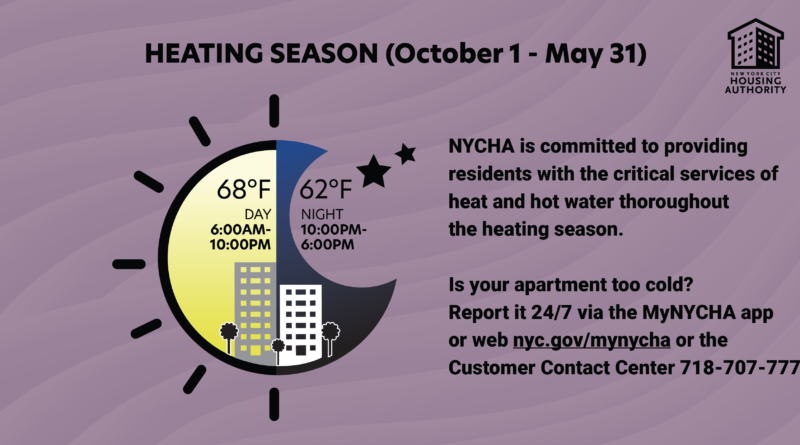NYCHA Is Ready for Heat Season
Heat season runs from October 1 through May 31 every year, and every year NYCHA prepares for it. Its Heating Management Services Department (HMSD) has worked throughout the year, performing preventative maintenance and inspections on 897 boilers, 1,733 hot water systems, and 1,619 heat distribution systems. In preparation for the 2024-2025 heating season, NYCHA’s heating teams performed annual preventative maintenance and made repairs, when necessary, to 99.9 percent of all heating equipment. These proactive measures demonstrate NYCHA’s dedication to providing reliable heat and hot water service for residents while minimizing potential heat service disruptions and fulfilling the obligations of the 2019 Agreement with the U.S. Department of Housing & Urban Development (HUD).
“As we enter the heating season, ensuring residents have consistent heat and hot water remains a top priority for NYCHA,” said NYCHA Chief Executive Officer Lisa Bova-Hiatt. “We understand how important it is for families to feel comfortable in their homes during the harsh winter months, and we remain dedicated to preventing service disruptions and expeditiously restoring service in instances of outages. Our dedicated Heating Management Services Department is fully prepared to address any challenges that may arise and will ensure swift and effective responses around the clock.”
“Our commitment to reliable heating service remains steadfast,” said NYCHA Chief Operating Officer Eva Trimble. “We have done extensive preventative maintenance ahead of this season to ensure the comfort and well-being of NYCHA residents across the five boroughs.”
Throughout the winter heat season from October through May, all New York City building owners must maintain an indoor temperature of at least 68 degrees between 6 a.m. and 10 p.m. when it’s below 55 degrees outside. From 10 p.m. to 6 a.m., the indoor temperature must be at least 62 degrees, regardless of the temperature outside. Hot water must be kept at a minimum temperature of 120 degrees at the source year-round.
Beginning each February, HMSD conducts an extensive annual preventive maintenance process to preserve and restore equipment reliability. This entails cleaning, lubricating, adjusting, repairing, and replacing worn components, and ensuring equipment and mechanical areas are in satisfactory operating condition. Each year, NYCHA also develops a list of critical heat and hot water equipment and systems needing replacement or extensive repair. The Authority invested over $43 million in heating infrastructure upgrades at two developments since last winter, and an additional $224 million of investment at eight developments is nearing completion this winter. The average age of NYCHA’s boilers is approximately 27 years old; the average expected useful life of boilers is approximately 25 to 30 years, so the work of boiler overhauls and upgrades, as well as preventive inspections, is critical to heat season operations.
Additionally, NYCHA has a reserve of staged and non-staged mobile boilers that can be activated in the event of a catastrophic heating emergency. There are currently 13 mobile boilers connected to developments and eight more that can be accessed and deployed if needed.
NYCHA has modernized heating controls at 66 developments and is in the process of completing that work at an additional nine developments. Apartments now maintain a comfortable range of 72-74 degrees during the day and 69-71 degrees at night, with the heat coming on in cycles to prevent wide temperature variations and to save energy costs. Residents at these buildings will no longer need to open their windows to let out excess heat.
Over the course of the 2023-2024 winter heating season, NYCHA developments experienced 11 percent fewer heat or hot water outages compared to the 2022-2023 season and maintained a seven-hour average restoration time. Residents experiencing issues with heat or hot water should call the Customer Contact Center at 718-707-7771 or report the issue via the MyNYCHA mobile app or website

